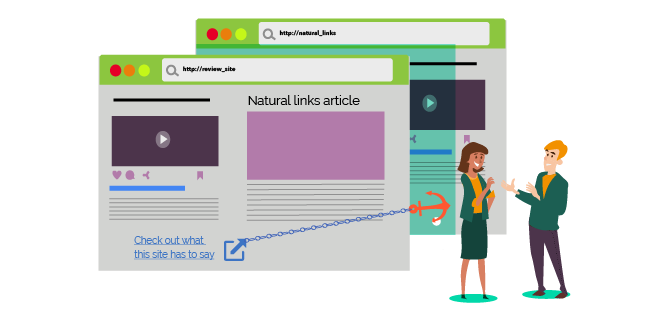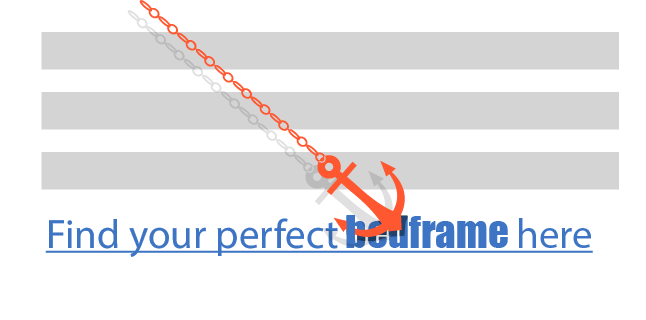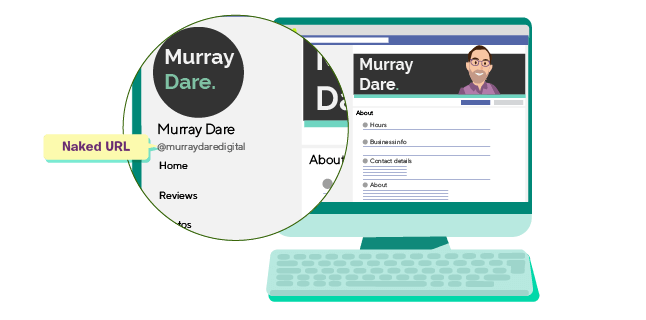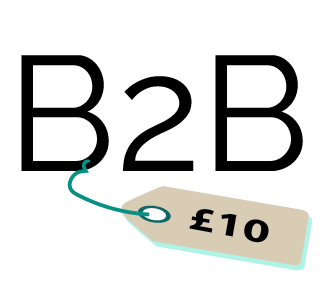Anchor text can impact your ability to rank on search engines. But what is it?
Well, it goes hand in hand with link building. When link building, it’s important to remember where exactly on a page of content the hyperlink is coming from.
This link source is called the ‘anchor text’. If search engines like Google assume you are linking to a source unnaturally for the purpose of gaining links – you could be penalised.
Search engines want to connect searchers to content that is most relevant and best addresses their query
If a searcher is directed to your site from an external source and your content isn’t what they’re expecting, they will quickly leave your site.
This affects your sites bounce rate and will indicate to the search engine that your content wasn’t relevant. Therefore, you will also rank lower for the particular keyword that was originally inputted by the searcher.
Beware of unnatural and exact match keywords
In addition, search engines have complex algorithms. These can determine from anchor text alone, whether the pages are trying to manipulate their rankings.
If a seemingly unnatural and exact match keyword is linking to another site, search engines will notice. They’ll know that the content isn’t written for a reader, but for ranking gains. And, as a result, will penalise them.

In fact, when most websites discover that their link building strategy hasn’t helped their rankings, it’s likely because of this. A search engine has detected unnatural keyword anchor text and punished them.
What Is a Natural Anchor Text?
Anchor text is the word or phrase that external sites add a hyperlink to when linking to your website. It is the text, image or button which indicates to a reader to click for further information.
Anchor text is usually described as ‘natural’ if it isn’t a commercial keyword phrase. Examples include:
- ‘Click here’
- ‘More info’
- ‘Visit this website’
- ‘See more’
- ‘Contact us’
The call to action seems like a natural place to link to further information, and the reader wouldn’t be surprised to see these words hyperlinked.
Natural anchor texts can also be branded, for example:
- ‘Visit example.com for more information’
- ‘example.com says’
- ‘Check out example.com’
As long as the branded anchor texts are being used correctly you shouldn’t have a problem. Use them to genuinely credit a brand or encourage users to read genuinely relevant content.
Why Is It Important To Create Natural Anchor Text?
Back when search engines were first finding their feet, their algorithms were pretty simple.
If you wanted to rank for a particular keyword, all you needed to do was get enough links from your targeted keywords on external sites that pointed back to your keyword-enriched webpage.
If your content and the anchor text links had high instances of a keyword, search engines would deem pages relevant. Thus, they would rank your pages higher.
Internet users soon found that they weren’t always being directed to quality content through these links. Often, they were spammy websites trying to artificially inflate their rankings.
Search engines caught onto this. As a result, they made their algorithms more complex in order to prevent these spam sites from ranking.
Search engines can now detect if you are trying to manipulate the algorithm because they analyse your anchor text distribution.
Today, if you build your links with exact match keyword anchor texts, you’re far more likely to get penalised.
So, for best practice, you should always have a seemingly natural anchor text profile. Try to rely on the quality of your content and backlinks in order to rank highly.
Understanding Exact Match Keywords

Exact match keywords are precisely that; links to the exact keywords in your content which you’re trying to target.
These types of anchor text should only make up an exceedingly small percentage of your entire link profile. Otherwise, search engines may suspect you’re using them to manipulate your rankings.
Examples of exact match keyword anchor texts include:
- ‘bedframe’
- ‘buy cheap bedframe’
- ‘wooden bedframe’
- ‘wooden bedframe sale’
- ‘bedframe shop london’
Be Cautious Around Exact Match Keyword Anchor Texts
Anchor texts which are an exact match with your target keywords are easy to target for link building.
This is because they’re usually identified during the keyword research stage of your SEO plan. This is usually where you find out what content your searchers are looking for.
You’ll probably create a piece of content which targets a keyword or phrase such as ‘bedframe’. But that doesn’t mean you should do your link building around it.
There are three main issues with doing so:
- Phrases like ‘bedframe shop london’ don’t make grammatical sense within the flow of content. If it were in a sentence, it wouldn’t make sense when read. Make sure you include the necessary fillers and fix grammatical errors so that it makes sense to the reader.
- If you are building a natural link profile (which you should be doing), how does the website giving you a backlink know which keywords to link to? They don’t, and nor should they if you’re trying to be as authentic as possible. Never ask for other websites to link to a particular word or phrase – that definitely isn’t natural.
- Will the content leading from the keyword match be genuinely valuable to your target audience? Everything you do for your content marketing strategy should be to benefit and fulfil a searcher’s internet search. So, if they click on a keyword match anchor text, is it going to send them to a genuinely relevant page? Or will it be less detailed content that’s trying to boost its rankings?
In terms of SEO, even the most authoritative and high-ranking websites – like Amazon – don’t use exact match keyword anchor text distribution. So, if they can rank highly through not doing it, so can you.
How To Rank Using Natural Anchor Text

There are five main ways you can try to create a natural anchor text profile. The first, is to optimise your on-page content as best as possible. This will ensure the content itself will get you ranking highly.
The other suggestions are ways to help you get backlinks to your site that come from natural anchor text. Some of these will occur naturally. For instance, the inclusion of a link to your site in your social media bio.
But some may require you to reach out to a site that’s linking back to you. Then, ask them to alter their wording to prevent penalisation.
1. On-Page Optimisation
Search engines are complex. They understand exactly what your webpage is about without needing to read an exact keyword anchor text.
Your content itself, the meta information, images and URLs can offer plenty of instances of your target keywords. These explain what your page is about before a search engine even needs to take your links into account.
So, rather than using keywords in your anchor text, you can enhance your on-page SEO using various keyword strategies. This will stop you from relying on backlinks with keyword-heavy anchor text. Instead, it will create a natural flow of keywords throughout your content.
You’ll be adopting the best mindset for improving your SEO. That is, to offer genuinely relevant and helpful content that fulfils your target audience’s query. As opposed to trying to take shortcuts to rank highly.
Always remember, if it seems like an easy fix, it’s probably too good to be true.
2. Partial Keyword Anchor Texts

A partial keyword anchor text is another way to try and link to your keywords naturally.
It involves getting your keywords within seemingly natural linked phrases or sentences. This will send a keyword signal to the search engine, but the algorithm doesn’t pick it up.
This is because the keyword hasn’t been overused and appears to fit naturally within the text.
For example:
- ‘You can learn more about choosing the right bedframe for your room by clicking here’
- ‘Find your perfect bedframe here’
- ‘If you’re looking for a bedframe store in London, check out this company’
With partial keyword anchor texts, make sure you link the entire phrase and not just the keyword. This will allow you to create a natural anchor text profile. One which still includes the keyword instances you need in order to rank for that particular search term.
However, as with any SEO tactic, be cautious of keyword overuse., This could constitute ‘keyword stuffing’ and could have you penalised.
3. Generic Anchor Text
A great alternative to having exact or partial keyword matches is to use generic anchor text.
Generic anchor text does not contain any keywords or branding. It can be safely used throughout your content to dilute any keyword-heavy anchor text.
Common generic anchor text examples include ‘read more’,’ ‘find out more,’ and ‘click here.’
Of course, you don’t want to overuse this type of anchor text either. If you continually encourage your audience to click through to other website’s content, you won’t have high engagement.
Your audience aren’t going to want to engage with your site for very long. And a short dwelling time will hinder your rankings.
Instead, try to use them towards the bottom-end of your content. That way, your audience can engage with your page before you direct them to other relevant information.
4. Co-Citation Keywords
Another way to avoid the issue of keywords in your anchor text is to use co-citations.
Co-citations are all about ensuring your keywords and phrases are near the hyperlinked anchor text but are not included in the link.
Examples include:
- ‘If you’re looking for a wooden bedframe that comes with a 10-year warranty, visit this website.’
- ‘I’ve found that this website offers the best selection of wooden bedframes.’
- ‘If you live in London, this company is currently offering free recycling for your old bed when your purchase a wooden bedframe.’
These co-citations are a safe way of allowing search engines to infer your keyword signals, without stuffing them into your anchor text.
Search engines will crawl this content from the external sites that link to you. And, they will understand what your content is about via the keywords you place close to the anchor text.
5. Naked URL Anchor Text

A naked URL link is one that points directly for your website. But, instead of hyperlinking text, the link itself is the hyperlink. E.g. ‘find out more over on www.example.com’
These types of links are commonly found in social media bios, source lists and on resource pages. Although they won’t directly send keyword signals to search engines, they can help to build a natural backlink profile.
As they tend to be found in bios and source lists, naked URLs can also greatly improve your authority online. If people link to you as a source of information or research, you’ll gain credibility and valuable backlinks to strengthen your domain authority.
Backlinking is important, anchor text less so
Backlinks are extremely important for your website’s SEO. Not only do they strengthen your domain authority – and help you to rank higher – they also give your brand credibility. And, help users to trust that you are an authoritative site that’s worth their engagement.
However, it’s extremely important that your backlinks are anchored to the right text. If you are asking external sites to hyperlink your targeted keywords, you could be penalised by the search engine and prevent ranking entirely.
Instead, you want to limit the amount of exact and partial keyword matches found in your anchor text profile.
As they tend to be found in bios and source lists, naked URLs can also greatly improve your authority online. If people link to you as a source of information or research, you’ll gain credibility and valuable backlinks to strengthen your domain authority.
Remember, a little optimisation can help
One way to limit these is to optimise the content itself. Use various keyword strategies to allow search engines to infer what the content being linked to is about.
However, you can also use keywords around your anchor text, naked URLs and generic anchor text citations to avoid a seemingly unnatural anchor text profile.
Just remember, search engines are focused on connecting searchers with content that’s relevant to their queries.
If content landed on via links appears spam-like or has been created solely to target keywords, it’s not of value. And, it’s not going to offer the best information for the searcher. Therefore, your content will not rank very high.
So, with your anchor text, as with anything you do for your SEO, always keep your audience and their experience on your site at the core of your strategy.
Outsourcing Your SEO To A Marketing Consultant
The process of link building and creating a natural anchor text profile is pretty easy to do. However, the creation, optimisation and link building for your content is a time-consuming process, especially if you are at the very start of your online strategy.
Many small businesses and start-ups often don’t have enough time to dedicate to their SEO strategy, and so they often choose to outsource it to a marketing consultant such as myself.
Working with you directly, my team and I can help you to create and implement an actionable marketing strategy. One designed to help you improve your rankings, increase your site traffic, and increase conversions.
If you’d like to hear about how we can help you to improve your website’s SEO, why not get in contact. I’d be happy to have an obligation-free chat and get to know your brand better.







